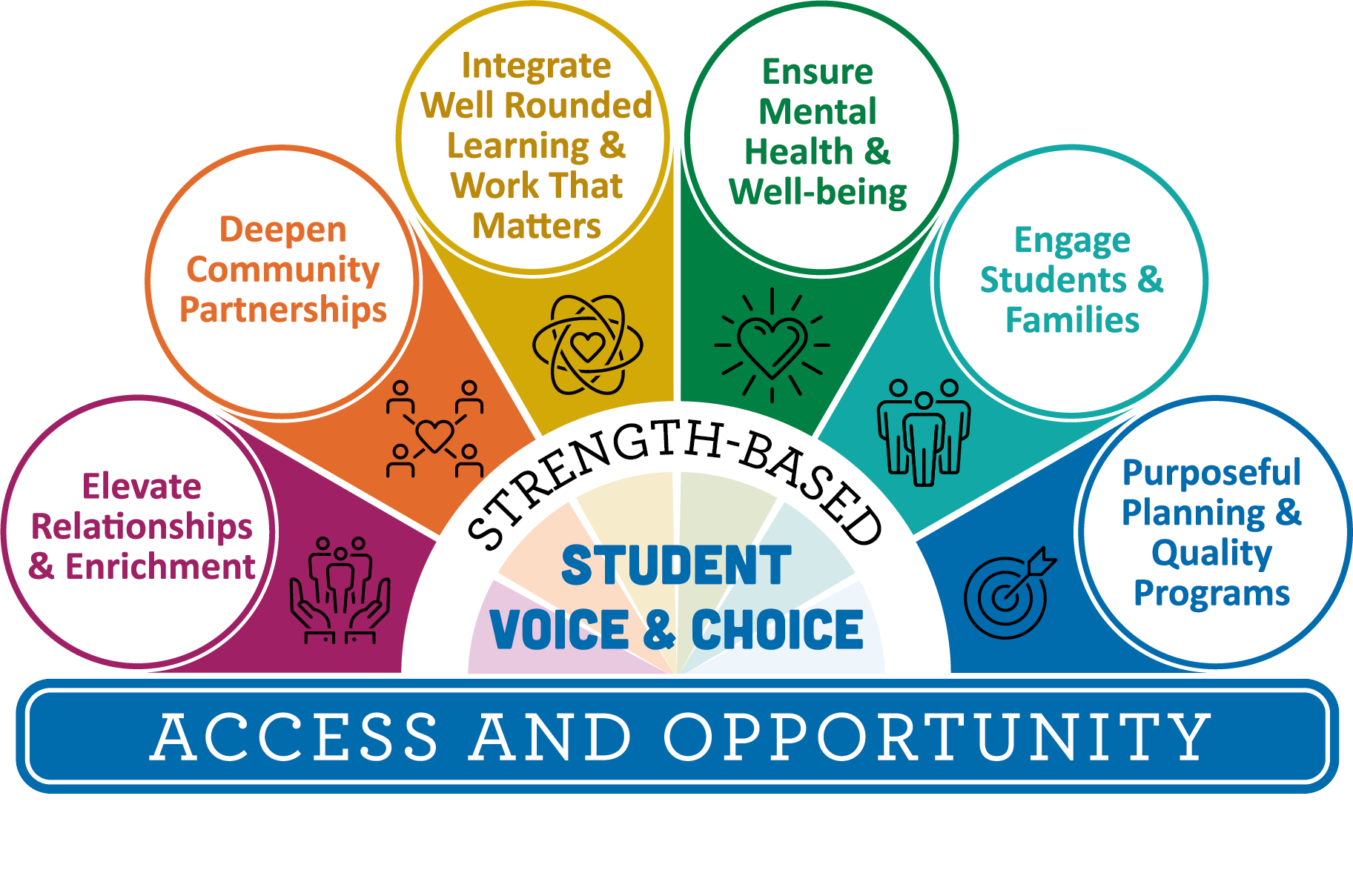Cultivating Joy, Connection, and Curiosity through Well-Rounded Expanded Learning
High quality afterschool and summer programs can increase learning, provide opportunities for enrichment, creativity, social connection, and promote mental health and wellness. Attendance in a 21st CCLC program alone doesn’t guarantee these benefits for youth:
quality matters.
A high-quality 21st CCLC program is shaped by the local community and the students and families it serves. There is not a singular pathway or simple formula to follow when creating a 21st CCLC program; instead, there are many evidence-based elements and best practices that should be considered within a local context and infused into programming.
A Foundation Built on Equity
Equity-driven expanded learning programs:
- provide child-centered opportunities that support every child with equitable access to safe, inclusive, and welcoming learning environments;
- affirm and grow student, family, and community strengths and assets; and
- create spaces for students to actively make decisions and voice their interest for deepened learning, engagement, and connection.
This foundation is purposefully integrated within each of the six elements of quality programs.

Six Elements of Quality Programs
-
Elevating Relationships & Enriching Environments - A quality program provides positive, supportive connections between students, their peers, and caring adults to create a foundation for rich, stimulating environments that promote and deepen learning.
-
Deepen Community Partnerships - A quality program develops, cultivates and sustains strong partnerships to integrate a common vision and co-create opportunities that complement and address the specific assets, needs, and dreams of the community.
-
Integrate Well Rounded Learning & Work That Matters - A quality program is intentionally designed to include hands-on, collaborative learning rooted in inquiry and discovery where students apply cross-cutting skills to make real-world connections.
-
Ensure Mental Health & Well-Being - A quality program ensures the emotional, social, cognitive, and behavioral conditions where students and staff can thrive and feel safe, supported, and healthy.
-
Engage Students & Families - A quality program employs a multi-faceted approach to outreach and engagement that respects, honors, and values families while fostering student joy and curiosity to promote regular participation.
-
Purposeful Planning & Quality Programs - A quality program has a clear mission, well-developed plans, highly-skilled staff, and clear policies and procedures that support effective
implementation for the continuous improvement and sustainability of the program.
Program Quality Resources
Summer and Afterschool
The guides below were written from evidence-based practices and promising practices which apply to both afterschool and summer learning.
Leadership & Capacity to Implement
Mental Health & Well-Being
K-5 Literacy
Middle & High School CTE
Mentoring & Tutoring Programs
Supportive mentoring and tutoring relationships can promote resilience and increase mental health and academic development. Y4Y offers a webinar focused on
21st CCLC mentoring programs, and the
National Partnership for Student Success provides technical assistance on establishing high quality mentoring and tutoring programs. Additional information on the benefits of high-quality mentoring, along with key components of productive mentoring relationships, are available from the
National Mentoring Resource Center and the
National Center on Safe Supportive Learning Environments.
Inclusion
KIT has quality inclusion resources for grantees and other afterschool providers to provide quality program services through best practice strategies. KIT's mission is to provide learning opportunities that support recreation, child development, and youth enrichment programs to include children with and without disabilities in out-of-school time programs. KIT offers diverse training resources under the National Training Center on Inclusion. KIT is noted for their high quality work and provides many additional inclusion resources.
Additional Resources
-
 OregonASK supports high-quality expanded learning programs by providing opportunities through connecting partners, supporting policy change, and providing professional development.
OregonASK supports high-quality expanded learning programs by providing opportunities through connecting partners, supporting policy change, and providing professional development. -
 The Afterschool Alliance is a nonprofit organization dedicated to raising awareness of the importance of afterschool programs and advocating for quality, affordable programs for all children.
The Afterschool Alliance is a nonprofit organization dedicated to raising awareness of the importance of afterschool programs and advocating for quality, affordable programs for all children.
-
 Wallace Foundation
Wallace Foundation
If you have questions, please email
ODE.OR21stCCLC@ode.oregon.gov.
Oregon Department of Education - Title IV-B Disclaimer of Endorsement
The content of the above links does not necessarily reflect the views or policies of ODE or the U.S. Department of Education, nor does mention of trade names, commercial products, or organizations imply endorsement by the Oregon Department of Education.
The presentations and documents funded by Title IV-B 21st Century Community Learning Centers (CCLC) included in Oregon Department of Education (ODE) conferences, and/or posted on ODE web pages may include links to information and resources created by other public and private organizations. These resources, materials, and links are provided for the user's convenience and to benefit program quality in Title IV-B. ODE does not control or guarantee the accuracy, relevance, timeliness, or completeness of this non-ODE information. The inclusion of these links is not intended to reflect their importance, nor is it intended to endorse views expressed, or products or services offered, on non-ODE sites.
It is a policy of the State Board of Education and a priority of the Oregon Department of Education that there will be no discrimination or harassment on the grounds of race, color, sex, marital status, religion, national origin, age, sexual orientation, or disability in any 21st CCLC educational program, activities, or employment. For more information, visit Oregon Department of Education's
Anti-Discrimination Policy page.